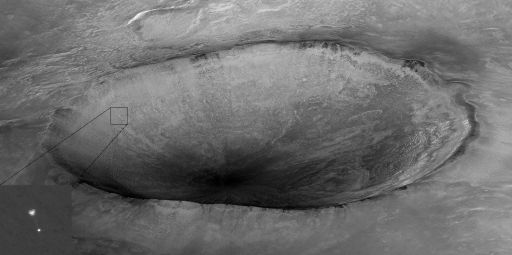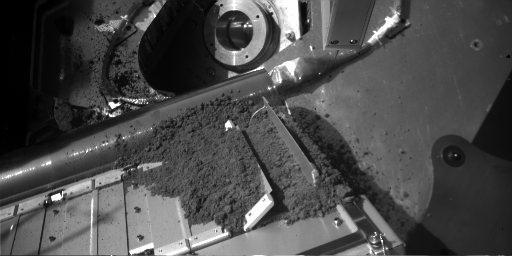Emily Lakdawalla • Jun 09, 2008
Phoenix and the Quest for the Improbable
While Emily is on vacation, Jim Bell is filing occasional reports from the road. Jim is an associate professor in the Cornell University Astronomy Department and the lead scientist for the Pancam color imaging system on the Spirit and Opportunity rovers. He is also a member of The Planetary Society's Board of Directors.

First off, hi everyone! It's a great pleasure to be asked to help fill in for Emily on The Planetary Society's Weblog this week. Emily is on a well-deserved vacation, and I hope she's relaxing and having fun and not reading this! She works incredibly hard to get all sorts of the latest interesting "insider" information about space exploration to Planetary Society members and others via these pages. It will be impossible to fill her shoes, but I have big feet so I'll clomp along and give it a go.
Emily also arranged for James Canvin to contribute Phoenix mission updates to the blog during her absence. I'm glad she arranged that, partly because I'm not directly involved in day-to-day (er, sol-to-sol) Phoenix operations myself, and partly because James is one of the best of the "armchair planetary scientists" (as Emily calls them) who follow many active missions very closely and who often create many of their own spectacular image products from the publicly-released mission data. I'm really looking forward to reading (and viewing) James' updates this week.
Despite not being directly involved in Phoenix mission operations, I have some indirect connections and relevant experience, and so I still wanted to spend some time in this entry talking about this latest exciting mission to Mars.
I had the pleasure of spending the afternoon of Sunday May 25 with more than 750 other space enthusiasts in Pasadena at The Planetary Society's "Planetfest" Phoenix mission landing event. What a party! Emily and others in The Planetary Society have described the excitement of the events of that day here in these pages, on Planetary Radio, and elsewhere, so I won't dwell on a play-by-play. Rather, what I found myself dwelling on for a while after the successful landing and first images was the magnitude of the sheer improbability of everything that we'd just witnessed.
We can think about Phoenix's seemingly improbable quest for mission success on the far northern plains of Mars on many levels. First, of course, there's the difficult engineering and technical achievement of remotely "piloting" and landing a robotic vehicle on another planet. This is no routine matter--about half of the previous attempted Mars missions have ended in failure. Moreover, the degree of overall complexity involved in designing, building, launching, and operating these machines is almost incomprehensible. That is, to me at least--I'm not an engineer or a manager. Thankfully, the Phoenix team is packed with some of the best technical and management folks in the business, however, and they've made it their job to understand the complexity and to minimize and manage the inherent risks.
Still, there are no guarantees in this line of work. I've been involved in several other missions where similarly-talented people went through similar wrestling matches with the beasts of complexity and risk, only to ultimately see the missions fail. People in the business of building spacecraft do the best that can be done within the available resource constraints (time, money, level of risk, etc.). Sometimes they succeed because of excellent design, proper contingency planning, great testing, and maybe also just plain luck. But sometimes they fail, despite all of that. I was thinking a lot about this cosmic roulette game that we all play, while Phoenix was hurtling towards the Martian tundra on landing day.

NASA / JPL / U. Arizona
Phoenix against Heimdall crater as it lands
This amazing image was captured as Phoenix came in for its Mars landing on May 25, 2008. The HiRISE camera on Mars Reconnaissance Orbiter pointed at Phoenix, which is seen here against the background of a 10-kilometer-diameter crater called Heimdall. The dramatic view makes it appear that Phoenix is falling into the crater, but in fact Phoenix was 20 kilometers closer to HiRISE than Heimdall, and it landed nowhere near the crater. The photo was taken 20 seconds after Phoenix' parachute opened.A second improbability is that the mission was conceived, built, and launched at all. In my experience, it seems like *every* planetary exploration mission begins with a political (or what NASA calls "programmatic") battle years before any metal is cut or wires are strung. Funding for the mission has to be carved out of extremely tight budgets, based on scientific and technological justifications that have been advocated by study groups and other committees, sometimes for a decade or more beforehand. Many of us scientists don't see ourselves as lobbyists, but in fact, it takes lobbying--to our colleagues, to NASA, to Congress--to get a mission going. Even after a mission gets an improbable "new start" it can be killed, by budget pressures (usually) or by other technical or programmatic concerns. Even missions that survive to the stage where proposals for payloads and specific scientific experiments have been submitted and accepted can ultimately be killed--maybe by a competing proposal that NASA or another space agency was carrying in parallel, or again by budgetary or other issues. Getting a mission to the launch pad involves as much drama and risk as a launch or landing itself, though most of it is behind the scenes and out of the public eye. I was thinking a lot about this improbability on Phoenix's landing day as well, having been involved in a number of mission concepts that never got that hoped-for new start.
Finally, I was thinking a lot that day about the scientific improbabilities inherent in Phoenix's mission. If they landed safely (which they did), would they find ice (It appears that they may have)? Will they be able to dig deeply into the ice-hardened soil? Will the ice and soil contain any hints of organic molecules? And maybe the greatest improbability of all--what if the instruments discover some sign of past or present life on Mars? It's a longshot, no doubt, but the probability is certainly zero if we don't look at all. I've actually been thinking a lot about this improbable but phenomenal possibility every day for more than four years now, when new images and other data come down from the Spirit and Opportunity rovers that we're helping to run at Cornell. What if there's a fossil? (We've been looking--nothing obvious yet. Let us know if you find one.) What if Phoenix or the upcoming Mars Science Laboratory rover find complex organic molecules? As my French friends would say, Vachement Bien! Holy cow!

NASA / JPL / UA / MPI
First soil sample delivered to TEGA
On sol 12, Phoenix dumped a scoopful of soil onto the open doors of TEGA oven #4. This photo, taken by the robotic arm camera, proves that the sample is totally covering the visible part of the screen protecting the interior of the oven from being clogged.This is, of course, one reason why we explore. And what an incredible age of exploration we live in: there are many similar "improbable missions" like Phoenix occurring across the solar system these days. It makes me wonder: when does a large number of improbable events conspire to culminate in the inevitable? Will these missions of exploration inevitably lead to the discovery of some new fundamental truths about our origins? Are they putting us all on a path towards an inevitable destiny as an interplanetary species? At the very least, it seems inevitable that these singularly-improbable missions of exploration will, collectively, be one of the lasting, positive legacies of this unique time in human history.
Support our core enterprises
Your support powers our mission to explore worlds, find life, and defend Earth. You make all the difference when you make a gift. Give today!
Donate

 Explore Worlds
Explore Worlds Find Life
Find Life Defend Earth
Defend Earth

